17 Oct 2014 | Bahrain, Bahrain Statements, Middle East and North Africa, News
Nine human rights organisations called on the British government on Friday to speak out publicly in the case of activists currently being detained in Bahrain. Prominent human rights defenders Nabeel Rajab, Zainab Al-Khawaja and Ghada Jamsheer have all been arrested and face lengthy prison sentences in Bahrain for cases of peaceful expression.
This echoes the message from Maryam Al-Khawaja, a prominent Bahraini activist and co-director of the Gulf Centre for Human Rights, earlier this week.
You can imprison a human rights defender, but you can’t stop the human rights cause, Al-Khawaja told a packed press conference in London on Wednesday, organised by Index on Censorship and the Bahrain Institute for Rights and Democracy (BIRD).
She urged UK authorities to speak out about rights abuses in her country, which she said is being run like a business by the ruling Al-Khalifa family. This comes after the arrest of her colleague, 2012 Index advocacy award-winner Bahrain Centre for Human Rights (BCHR) president Nabeel Rajab. He is facing charges of insulting government institutions on Twitter. His trail opens on 19 October.
Also on Wednesday, her sister Zainab Al-Khawaja, who is 8 months pregnant, was sentenced to seven days’ detention for publicly insulting King Hamad bin Isa Al-Khalifa by ripping up a picture of him in court. She was in court over charges connected to her previous human rights campaigning.
Al-Khawaja, a dual Danish and Bahraini citizen, was herself recently released on bail after being arrested at Bahrain International Airport when trying to enter the country to see her father. She said: “I was stopped at the airport where I was told falsely that my citizenship had been revoked.”
She was then assaulted by police at the airport, and is still recovering from a torn muscle in her shoulder as a result. The police officer who assaulted her later filled charges against Al-Khawaja, presenting a scratched finger as medical evidence.
Al-Khawaja spoke of her time in Isa Town women’s prison, where she spent 19 days; she described poor sanitation and said there were no nurses or doctors available at night and it took 45 minutes for ambulances to reach the facility.
Al-Khawaja’s father, Abdulhadi Al-Khawaja, the founder of 2012 Index award winner BCHR, is serving a life sentence after playing a prominent role in the country’s 2011 pro-democracy protests.
Al Khawaja described how changes could be implemented in Bahrain, saying there is a need for pressure from countries such as the UK and US, who have the capability to make sure the government respect human rights.
“Reform can be implemented and enforced by accountability,” she said.
Nominations are now open for the Index Freedom of Expression Awards 2015. Put forward your free expression heroes here.
Nabeel Rajab Arbitrarily Detained
Please ask your MP to support the campaign by writing to the Foreign and Commonwealth Office. (This web app will take you to the website of the Bahrain Institute of Rights and Democracy)
Maryam Al-Khawaja spoke about her arrest, Nabeel Rajab’s case and more in her opening statement
She also described conditions inside Isa Town Prison, where she was held for 19 days
Videos via Truthloader
This article was originally posted on 15 October 2014 and updated on 17 October 2014 at indexoncensorship.org
13 Oct 2014 | Azerbaijan, Azerbaijan News, Europe and Central Asia, News
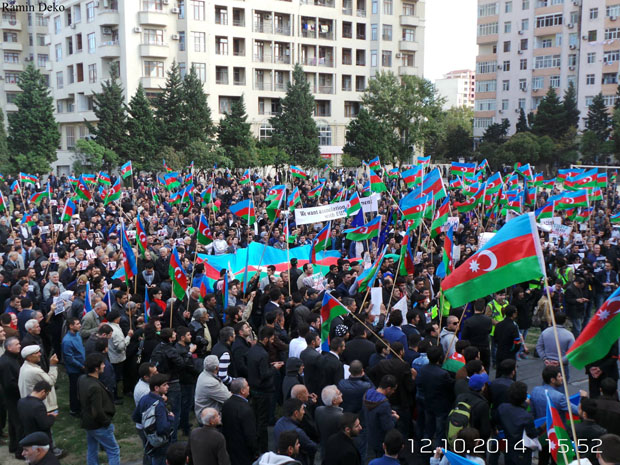
Thousands of Azerbaijanis took to the street on Sunday, calling for the resignation of President Ilham Aliyev, the release of political prisoners and an end to human rights abuses in the country. The protest comes during an ongoing and wide reaching crackdown on regime critics.
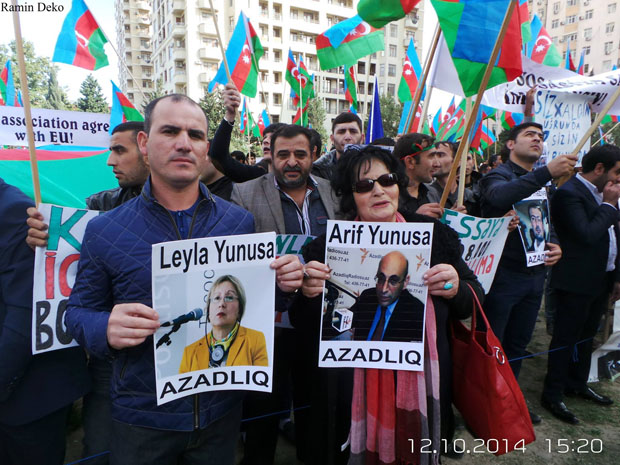
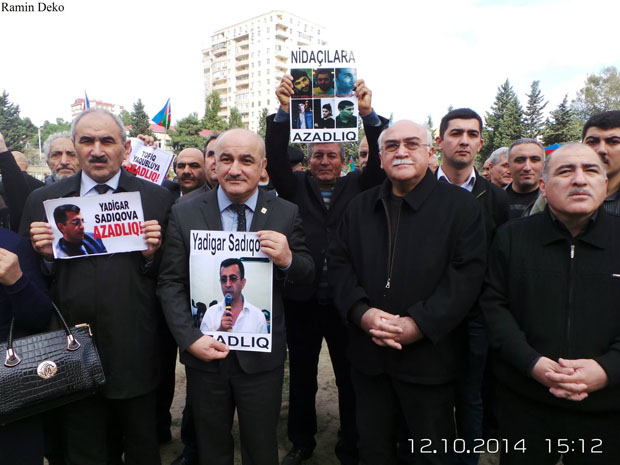
On Saturday, investigative journalist Khadija Ismayilova was placed under a travel ban. The award-winning reporter has covered corruption allegedly connected to Aliyev, and has been targeted by government supporters in the past. She is currently facing criminal charges of libel and document forgery, which she denies and vows to fight.
Last week, Index reported journalist Arzu Geybulla being threatened on social media and accused of treason after being interviewed by Azerbaijani news site Modern.az.
These cases follow the jailing of several prominent and critical voices within Azerbaijan’s civil society. Human rights defender Leyla Yunus and her husband Arif were detained in July, followed by fellow rights activist Rasul Jafarov, lawyer Intigam Aliyev and journalist Seymur Hezi.
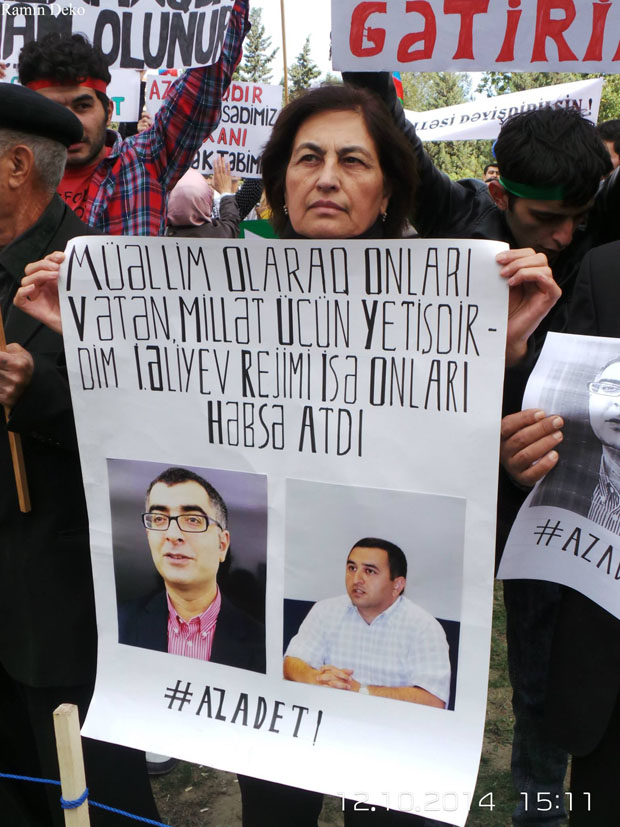
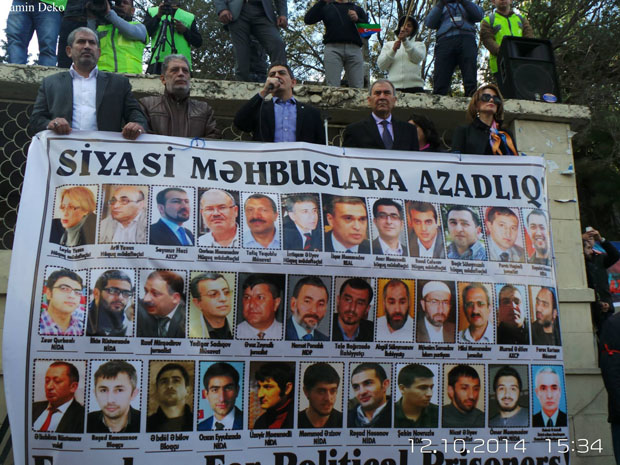
The European Parliament recently called on Azerbaijan — currently chairing the Council of Europe — to release several prominent political prisoners and proceed with reforming the country’s human rights policies. Before being arrested, Jafarov had worked on putting together a detailed list of the country’s political prisoners, with the latest figure coming to 98.
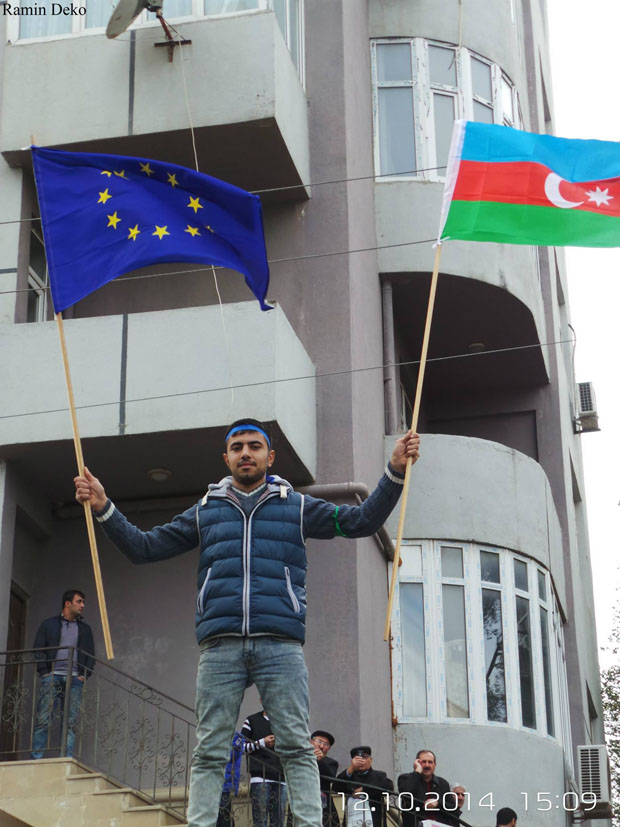
The protest, which also called for closer ties to the European Union, was approved by authorities, but took place in a remote part of Baku.
All photos by Ramin Deko
This article was posted on 10 October 2014 at indexoncensorship.org
10 Oct 2014 | Draw the Line, Youth Board

As protests continue to rock many countries, at times leading to use of excessive force including tear gas and rubber bullets by law enforcement officers against protesters, people have openly raised questions on police abuse. This month’s Draw the Line question focused on the excessive use of force during protests and the role police can play in striking the balance between keeping the peace and protecting free speech.
Being a witness to recent protests that turned ugly after use of batons, tear gas and rubber bullets against civilians protesting rigged elections in Pakistan, it was interesting to compare various responses on the #IndexDrawtheLine Twitter feed offered by participants from different parts of the world. An article shared by Fiona Bradley during the debate on Twitter discussed attempts made by Chinese authorities to censor use of police force against pro-democracy protesters in Hong Kong. The use of tear gas and counter protesters to disperse demonstrators has also changed the popular opinion regarding the city’s police that was once considered to be the best in region. On the other hand, an Amnesty International report revealed cases of excessive use of force by Brazil’s police throughout the protests that erupted before and during the Fifa World Cup this summer. This clearly depicts the extent to which police can be used by local authorites against civilians’ voicing their opinion publicly.
In an interview for the PBS Newshour, Margaret Huang, deputy executive director of campaigns and programs at Amnesty International’s US arm, raised an important point about the tactics deployed by the police in Ferguson, Missouri, during protests during there. “The police’s reaction might have been an overreaction. It may have actually been a violation of international standards for appropriate police response. If your purpose is to disperse people, tear gas is not a great tool for that,” Huang said. “It’s worth noting that tear gas is actually a weapon that’s not allowed to be used in warfare”, she said, “because it can be indiscriminate in who it targets. So the fact that police agencies in [the US] use it for crowd dispersal raises huge concerns about whether that’s a useful or appropriate response.”
Another important concern that has been raised is the increasing militarisation of police that is counter productive and looks more like an intimidating combat against foreign enemies in a war zone. In this case, should protesters have their own force to protect them in case the police start firing rubber bullets and tear gas on non-violent protesters or should there be appropriate training on dealing with such scenarios, keeping in mind the wide difference in domestic and military operations?
It is generally accepted that the state has an obligation to prevent injury and loss of life during public gatherings while maintaining public order to prevent social disruption and damage to property, according to the United Nations. Disgraceful police excesses will continue unabated during public gatherings unless authorities bring police tactics in line with basic human rights standards whether they belong to US, China or developing countries in south Asia and the Middle East.
A few participants from Pakistan offered the point that their country’s police cannot be trained on the lines of “protect and guard” instead of “us versus them” unless officials are appointed on merit without any political interference. But in the case of countries where political interference during recruitment isn’t the problem, one can not help but wonder about the steps required to make the police fall in line with defined international standards.
In the wake of G20 protests in London during the year 2009 that resulted in the death of news vendor Ian Thomilson, the Metropolitan Police came up with a 60 page report Adapt to Protest which advocated the need of major reforms required to deal with policing of protests. The report made a number of immediate recommendations that stressed facilitating peaceful protests, improving communication with the public/ protest groups through dialogue and moderating the impact of containment for proper access of food, water and other essentials. It acknowledged the dire need of giving importance to human rights during operational decisions and training that is needed to equip officers with tactics for effective policing and facilitating of protest activity. Such steps need to be introduced by law enforcement and then implemented independently which is not possible without the cooperation of political authorities and the public.
In this age of instant communication, people are bound to question images and videos of police abuse during mass protests accessible through internet and live television. The only way for police to strike the balance in maintaining peace and protecting civilians’ right to free speech and assembly is to start approaching it as a healthy expression of democracy instead of a menace that needs to be stifled and discouraged.
This article was published on 10 October 2014 at indexoncensorship.org
3 Oct 2014 | Bahrain, Bahrain Statements, Middle East and North Africa, News

Nabeel Rajab during a protest in London in September (Photo: Milana Knezevic)
Nabeel Rajab, a prominent Bahraini human rights activist and Index award winner, has been detained for seven days while being investigated for claims that he offended the Ministry of Interior over Twitter.
Index CEO Jodie Ginsberg said: “Index is deeply concerned that the UK government has done little to press Bahrain to improve its human rights record. Instead the UK talks repeatedly of improvements in the human rights system in Bahrain when it is clear that rights such as freedom of expression are not being respected.” Index is writing to UK MPs to raise the case of Rajab.
On 1 October, Rajab, president of the Bahrain Centre for Human Rights (BCHR) and director of the Gulf Centre for Human Right (GCHR), was summoned by the cyber crimes unit of the Criminal Investigation Directorate. He is alleged to have “denigrated government institutions” on Twitter, according to the Ministry of Interior. Rajab was released in May after two years in prison on charges including making offensive tweets and taking part in illegal protests.
Rajab “has been targeted with repeated arrest and detention because of his work in the field of human rights” and “the government’s aim is to hinder his advocacy work both inside and outside of Bahrain”, said BCHR, Americans for Democracy and Human Rights in Bahrain (ADHRB) and the Bahrain Institute for Rights and Democracy (BIRD).
The arrest came shortly after Rajab’s return to Bahrain following an international trip to raise awareness of human rights violations in his country. He was calling for the release of human rights activists — and father and daughter — Maryam and Abdulhadi Al-Khawaja. Maryam has since been released on bail, her travel ban lifted and trial postponed until 5 November. Abdulhadi continues to serve the life sentence handed down to him in 2011, after playing a prominent role in the country’s pro-democracy protests that year.
While in London, Rajab told Index about the human rights and free speech situation in Bahrain, saying that “at least 50,000 people” had been in and out of jail in the past three months alone, “just for practising their right to freedom of assembly, freedom of gathering, freedom of expression”.
“It is time for Bahrain’s rulers to stop harassing human rights defenders and silencing free speech, and live up to their international obligations – including those they pledged again to uphold as part of the UN Universal Periodic Review just last month. Please, let our colleagues go free. Free Nabeel Rajab and drop the charges facing Rajab and the Al-Khawajas, ” GCHR said in a statement.
Correction 10:30, 3 October: Due to a typo, an earlier version of this article used the number “50,0000” instead of “50,000”.
This article was posted on 2 October 2014 at indexoncensorship.org








